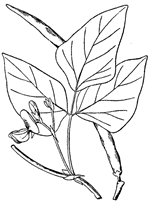This page has been archived and is being provided for reference purposes only. The page is no longer being updated, and therefore, links on the page may be invalid.
|
Presenting: Two New Southernpea Varieties
By Luis PonsMarch 23, 2005
Growers of southernpea in the southeastern United States have two new varieties to choose from, including one that resists a troublesome nematode.
The new cultivars are Charleston Blackeye, which resists root-knot nematodes (Meloidogyne spp.), and Baby Cream, which offers high yields of small, delicate peas. They were developed at the U.S. Vegetable Laboratory, operated in Charleston, S.C., by the Agricultural Research Service (ARS), the U.S. Department of Agriculture's chief scientific research agency.
Southernpea, Vigna unguiculata (L.) Walp., is also known as cowpea, crowder pea or black-eyed pea. It is coveted for its high protein, drought tolerance and adaptability to poor soils. As a vegetable, it's widely used by the frozen food and canned vegetable industries. It's also used as a cover crop and as forage.
Charleston Blackeye, developed by geneticist Richard Fery and plant pathologist Judy Thies, is aimed at home and market gardeners who grow the traditional, fresh-shell, black-eye type of peas.
Its parental lines are Bettergro Blackeye, a nematode-resistant cultivar released 13 years ago by Fery and colleagues, and Au 84-G-328, a pinkeye-type line developed at Auburn University. In tests, Charleston Blackeye matured earlier, produced smaller seeds and exhibited similar yield potential to Green Dixie Blackeye, a high-yielding southernpea that ARS released in 2000.
Meanwhile, Baby Cream, developed by Fery over a 16-year period, has early-maturing characteristics that give it potential to replace White Acre, a leading commercial cream-type cultivar. These cultivars are popular because their peas are succulent and have a milder, less starchy flavor and a better appearance than black-eye types.
According to Fery, Baby Cream--a cross between White Acre and breeding line US-432--should be more suitable than White Acre for use in modern, high-density cropping systems. In tests, it produced dry pods one to two weeks earlier than White Acre.
A limited quantity of seed of these new varieties is available to southernpea seed producers who make a written request to Fery at 2700 Savannah Hwy., Charleston, SC 29414, by March 31.

